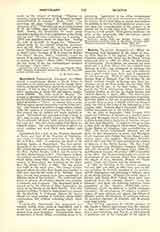

Basutoland, PREFECTURE APOSTOLIC OF.—Basutoland, a mountainous district of South Africa, is bounded on the north and west by the Orange River Colony, on the east by Natal, and on the south by Cape Colony. It has an area of 10,293 square miles. The white population is about 700 and natives number about 309,000. The chief town is Maseru. The county is administered by native chiefs under an acting British Resident Commissioner who meets the National Assembly or “Pitso” in council once a year. Whites require special permission to settle in the country. The climate is healthful, though cold in winter, while the summer is characterized by heavy rains. The country has no railway nor roads properly so called. Basutoland was annexed to Cape Colony in 1871, and became a British Crown Colony in 1884. The inhabitants, till about 1820, were Bushmen of a low type but they have been replaced by highly intelligent Kafirs. The principal articles of export are wheat, mealies, and wool, Kafir corn, mohair, and cattle.
Basutoland, first a part of the Vicariate Apostolic of Natal, and later of the Vicariate of Kimberley, was made an independent prefecture by the Holy See on May 8, 1894. It comprises the whole of the territory known as Basutoland. The first prefect Apostolic of the new ecclesiastical territory was the Rev. Father Monginoux, O.M.I.; he was succeeded by the Rev. Father Baudry, O.M.I., and the latter by the Rev. Father Cenez, O.M.I. The Oblates of Mary Immaculate established themselves in that portion of South Africa about 1862. Roma, the first Catholic mission in Basutoland, was founded by the Right Rev. Dr. Allard, O.M.I., in 1862. The first church was built in the same year. The second mission situated about six miles from Roma was founded in 1867 and received the name of St. Michael. Since then, several new missions have been established in different parts of the territory. The prefecture possesses at present 19 churches, chapels, and stations, 5 convents, and 9 schools. The missionary work is carried on by the Oblates of Mary Immaculate assisted by the Sisters of the Holy Family. The total number of Oblate Fathers in Basutoland is at present 19; lay brothers, 6; European Sisters, 34; native Sisters, 12; total number of Catholics, about 8,900; catechumens, 700; children attending school, about 1,200.
Undoubtedly Christianity has progressed immensely during recent years in Basutoland, and it would have spread still more speedily had the resources been more abundant. Unfortunately, there, as elsewhere in South Africa, everything seems to be precarious. Agriculture is too often compromised by long droughts, and crops are sometimes destroyed by locusts, all of which bring on misery and famines. In addition to this the limited number of priests does not allow the evangelization of the country to be carried out on a very large scale. The population, however, is well settled, which greatly facilitates the work of the missionary, who can remain always in touch with his flock.
A. LANGAUET

